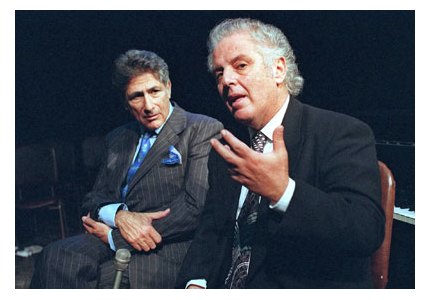Remembering Edward Said (em inglês)
Texto de despedida de Daniel Barenboim a Edward Said
 Perhaps the first thing one remembers about Edward Said was his breadth of interest. He was not only at home in music, literature, philosophy, or the understanding of politics, but also he was one of those rare people who saw the connections and the parallels between different disciplines, because he had an unusual understanding of the human spirit, and of the human being, and he recognized that parallels and paradoxes are not contradictions.
Perhaps the first thing one remembers about Edward Said was his breadth of interest. He was not only at home in music, literature, philosophy, or the understanding of politics, but also he was one of those rare people who saw the connections and the parallels between different disciplines, because he had an unusual understanding of the human spirit, and of the human being, and he recognized that parallels and paradoxes are not contradictions.
He saw in music not just a combination of sounds, but he understood the fact that every musical masterpiece is, as it were, a conception of the world. And the difficulty lies in the fact that this conception of the world cannot be described in words—because were it possible to describe it in words, the music would be unnecessary. But he recognized that the fact that it is indescribable doesn’t mean that is has no meaning.
This very curious mind, of course, allowed him privileged glimpses into the subconscious of people, of creators. And added to that he had a very unrestrained courage of utterance, and this is what earned him the admiration, the jealousy, and the enmity of so many people.
Many Israelis and Jews did not want to tolerate his criticism, not just of the present Israeli government, but of a certain mentality that he identified in Israeli thoughts and deeds—namely the lack of empathy with the fact that the very same war of independence of Israel in 1948, which brought about the acquisition of a new identity for the Jewish part of the population, was not just a military defeat, but also a psychological catastrophe for the non-Jewish population of Palestine. And therefore he was critical of the inability of Israeli leaders to make the necessary symbolic gestures that have to precede any political solution. The Arabs, on the other hand, were and are still unable to accept his sensitivity toward Jewish history, limiting themselves to repeat their innocence as far as the suffering of Jewish people is concerned.
It was precisely this ability of his to see not only the different aspects of any thought or process, but their inevitable consequences as well and also the combination of human, psychological, and historical, as the case may be, “pre-history” of such thoughts and processes. He was one of those rare people who was permanently aware of the fact that information is only the very first step toward understanding. And he always looked for the “beyond” in the idea, the “unseen” by the eye, the “unheard” by the ear.
It was a combination of all these qualities which led him to found together with me the West-Eastern Divan, which provides a forum for young Israeli and Arab musicians to learn together music and all its ramifications.
The Palestinians have lost one of the most eloquent defenders of their aspirations. The Israelis have lost an adversary—but a fair and humane one.
And I have lost a soul mate.
Daniel Barenboim
